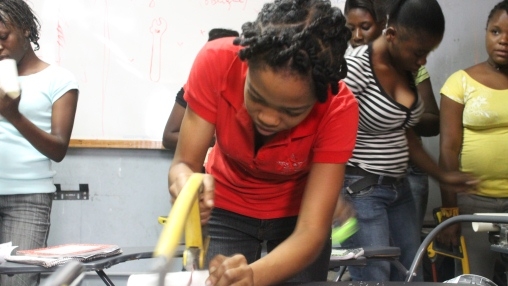Challenge
The 2010 earthquake led to important changes in the notion of socio-economic vulnerability and social norms regarding acceptable jobs for women. As a result of the high demand for qualified labor, employers engaged in reconstruction identified young women as a potential and untapped resource. This situation represented an unprecedented opportunity for the AGI pilot program to support young women in their effort to gain a strategic foothold in Haiti’s formal labor markets.
Solution
The grant addressed several key challenges:
- Empower vulnerable young women in a fragile country.
- Build human capital through non-traditional technical skills to overcome low educational attainment.
- Understand the barriers to youth employment.
- Improve the connection between labor supply and demand, particularly in sectors of high growth potential.
Seven sub-components form the design of the pilot:
- Community NGOs: The Community NGOs located in five boroughs (quartiers) of Port-au- Prince identified the young women during the project preparation phase and are charged with their care during implementation. They also administer most of the soft-skills modules of the curriculum.
- Soft-skills curriculum: Building on best prac- tices worldwide, the Haiti AGI has developed a high-quality soft-skill curriculum composed of eight modules: (i) self-esteem, (ii) civic engage- ment and leadership, (iii) reproductive health, (iv) gender-based violence and its responses, (v) preparing for the workplace and work ethics, (vi) disaster preparedness, (vii) financial literacy, and (viii) living with a disability. The existing curriculum has proven to be ill-adapted to the Haitian context, being mere translations of curriculum developed for other countries, notably in Africa. Using a focus group, the pilot curriculum has been, therefore, adapted and illustrated for the Haitian context. It is expected to serve as a basis for part of the technical training. As such, the curriculum will be a specific output of the pilot provided to the Gender Ministry (Ministère à la Condition Feminine et aux Droits des Femmes- MCFDF
- Non-traditional technical training: The young women receive non-traditional technical training (mechanics, refrigeration, electricity, construction, computer science, IT Essentials: PC Hardware and Software / Cisco academy, hoteling) for four-to-six months in four training centers in Port-au-Prince.
The choice of the training centers was based on consultation with employers, who confirmed the quality and relevance of the training of- fered, and the focus on employability. To make informed decisions based on their individual capacities and previous academic backgrounds, the young women were presented with different training options and the corresponding career and employments opportunities. - Internship and employers: At the end of their training, the young women will be offered internships to help them transition into labor markets. Those internships will continue to be secured in coming months by the training centers, supported by the Bank team. The project will follow the placement of the young women over the six months following their training and internship.
- Stipend and cell phones: The Haiti AGI pro- vides the beneficiaries with stipends to cover the cost of transportation and other related expenses. The stipends amount to about 2,000 HTG (about USD$50) per month and will be paid using mobile money.
- Impact evaluation: In October 2012, through a public lottery and in presence of the selected young women and the AGI field coordinator, the community NGOs, conducted the random- ized assignment of the young women to each cohort. The preliminary results of the baseline survey are being finalized.
- Monitoring and evaluation: Monitoring and Evaluation (M&E) is composed of an online platform where information from training centers and community NGOs is centralized and validated by the M&E coordinator. As part of the activities, a monthly training session on capacity strengthening in M&E will be conducted with the NGOs and the training center partners.

